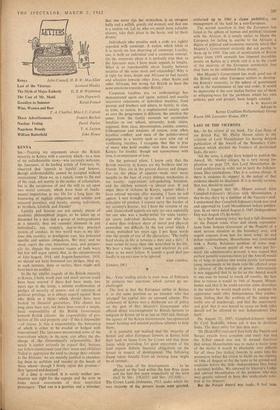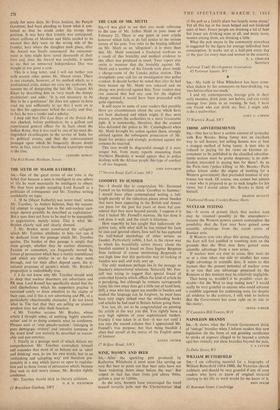LAST OF THE VICEROYS
SIR,—In his review of my book, The Last Days of the British Raj, Mr. Philip Mason refers to my criticism of Lord Mountbatten for having delayed publication of the Award of the Boundary Corn- mission which decided the frontiers of partitioned India. He says: 'All the same, it might have helped to publish the Award. Mr. Mosley alleges, by a very strong im- plication on page 229, that Lord Mountbatten de- layed publication in order not to spoil the Indepen- dence Day 'celebrations. This is a serious charge; if there is evidence to support it, the nature of that evidence should be disclosed. If it is merely surmise, that, too, should be stated.'
May I suggest that Mr. Mason consult Alan Campbell-Johnson's Misiion isqth Mountbatten, a day-to-day diary by a member of the Viceroy's staff. I understand that Campbell-Johnson's book was read and approved by Lord Mountbatten before publica- tion. In an entry dated August 9, 1947 (Independence Day was August 15), he writes: 'At a Staff meeting today we had a full discussion • on the Punjab crisis. Over and above representa- tions from Jenkins (Governor of the .Punjab) of a most serious situation in the boundary area, and urgent requests from him for more army, air and police reinforcements, Mountbatten was confronted with a Public Relations' problem of some mag- nitude: . . . Various points of view were put for- ward. On administrative grounds it was argued that earliest possible announcement [of the Award] would be of help to Jenkins and would enable last-minute troop movements to be made into the affected areas in advance of the transfer of power. Alternatively it was suggested that in so far as the Award would in any case be hound to touch off trouble, the best date to release it would be 14th of August. Mount- batten said that if he could exercise some discretion in the matter he would much prefer to postpone its appearance until after Independence Day celebra- tions, feeling that the problem of the timing was really one of psychology, and that the controversy and grief that it was bound to cause on both sides should not be allowed to mar Independence Day itself.'
On August 12, 1947, Campbell-Johnson visited Sir Cyril Radcliffe, whose job it was to partition India. The diary entry for that date says:
'He [Radcliffe] explained that both the Punjab and Bengal awards were complete and ready but that the Sylhet award was not. It seemed therefore that unless Mountbatten was to make a major issue of the matter it would he physically very difficult for all three [my italics] Awards to come into his possession before his return to Delhi on the evening of 14th of August or for the texts to be printed and available before the 16th—Independence Day being a national holiday. We returned to Viceroy's Lodge and advised Mountbatten of the position, who was very greatly relieved to have this ready-made solu- tion at his disposal.'
But the Punjab Award was ready. It had been ready for some days. Sir Evan Jenkins, the Punjab Governor, had been pleading to know what it con- tained so that he could order• his troops into position. It was here that trouble was anticipated, where millions of Moslems and Sikhs needed to be warned that they were on the wrong side of the frontier, here where the slaughter took place, after the Award was finally announced. An announce- ment in time might have saved thousands of their lives and, since the Award was available, it seems to me that an unmarred Independence Day was bought at too great a cost.
This is a long letter, and I will not bother you with several other points Mr. Mason raises. There is one example, however, of his method which, as a professional critic, makes me raise my eyebrows. Be accuses me of denigrating the late Mr. Liaquat All Khan by describing him as 'very much the dumpy proletarian' and adds: 'It is not necessary to be thin to be a gentleman.' He does not appear to have read my text sufficiently to see that I went on to say that his appearance belied the reality and that, in fact, he was a reader and a scholar.
I may add that The Last Days of the British Raj was checked, before publication, by a gallant and experienced general officer for its facts about the Indian Army, that it was read by one of his most dis- tinguished ex-colleagues in the service of India for its political events, and that the conversational passages upon which he frequently throws doubt were, in fact, taken from shorthand transcripts made at the time.
LEONARD 'MOSLEY The Red House, Binihant, Sussex



































 Previous page
Previous page